[English] 日本語
 Yorodumi
Yorodumi- EMDB-34188: Structure of beta-arrestin1 in complex with a phosphopeptide corr... -
+ Open data
Open data
- Basic information
Basic information
| Entry |  | |||||||||
|---|---|---|---|---|---|---|---|---|---|---|
| Title | Structure of beta-arrestin1 in complex with a phosphopeptide corresponding to the human C-X-C chemokine receptor type 4, CXCR4 | |||||||||
 Map data Map data | Full map with pixel size 0.878. | |||||||||
 Sample Sample |
| |||||||||
 Keywords Keywords | GPCR / Arrestin / SIGNALING PROTEIN | |||||||||
| Function / homology |  Function and homology information Function and homology informationV2 vasopressin receptor binding / alpha-1A adrenergic receptor binding / follicle-stimulating hormone receptor binding / TGFBR3 regulates TGF-beta signaling / sensory perception of touch / G alpha (s) signalling events / C-X-C motif chemokine 12 receptor activity / regulation of inositol trisphosphate biosynthetic process / follicle-stimulating hormone signaling pathway / protein phosphorylated amino acid binding ...V2 vasopressin receptor binding / alpha-1A adrenergic receptor binding / follicle-stimulating hormone receptor binding / TGFBR3 regulates TGF-beta signaling / sensory perception of touch / G alpha (s) signalling events / C-X-C motif chemokine 12 receptor activity / regulation of inositol trisphosphate biosynthetic process / follicle-stimulating hormone signaling pathway / protein phosphorylated amino acid binding / alpha-1B adrenergic receptor binding / positive regulation of macrophage migration inhibitory factor signaling pathway / Lysosome Vesicle Biogenesis / Specification of primordial germ cells / CXCL12-activated CXCR4 signaling pathway / myosin light chain binding / AP-2 adaptor complex binding / Ub-specific processing proteases / angiotensin receptor binding / MAP2K and MAPK activation / Golgi Associated Vesicle Biogenesis / myelin maintenance / C-X-C chemokine receptor activity / positive regulation of vasculature development / Cargo recognition for clathrin-mediated endocytosis / clathrin-cargo adaptor activity / Clathrin-mediated endocytosis / Signaling by ROBO receptors / negative regulation of interleukin-8 production / regulation of chemotaxis / Formation of definitive endoderm / C-C chemokine receptor activity / regulation of G protein-coupled receptor signaling pathway / Developmental Lineage of Pancreatic Acinar Cells / C-C chemokine binding / cysteine-type endopeptidase inhibitor activity involved in apoptotic process / arrestin family protein binding / G protein-coupled receptor internalization / mitogen-activated protein kinase kinase binding / Chemokine receptors bind chemokines / anchoring junction / dendritic cell chemotaxis / Thrombin signalling through proteinase activated receptors (PARs) / response to morphine / clathrin binding / stress fiber assembly / positive regulation of Rho protein signal transduction / cellular response to cytokine stimulus / pseudopodium / cell leading edge / negative regulation of interleukin-6 production / positive regulation of oligodendrocyte differentiation / positive regulation of receptor internalization / negative regulation of Notch signaling pathway / phototransduction / Binding and entry of HIV virion / positive regulation of insulin secretion involved in cellular response to glucose stimulus / regulation of cell adhesion / coreceptor activity / insulin-like growth factor receptor binding / clathrin-coated pit / neurogenesis / negative regulation of protein ubiquitination / GTPase activator activity / ubiquitin binding / nuclear estrogen receptor binding / positive regulation of protein ubiquitination / cell chemotaxis / phosphoprotein binding / calcium-mediated signaling / G protein-coupled receptor binding / brain development / G protein-coupled receptor activity / negative regulation of ERK1 and ERK2 cascade / response to virus / adenylate cyclase-modulating G protein-coupled receptor signaling pathway / endocytosis / positive regulation of protein phosphorylation / late endosome / protein transport / positive regulation of cold-induced thermogenesis / actin binding / positive regulation of cytosolic calcium ion concentration / virus receptor activity / cytoplasmic vesicle / ubiquitin-dependent protein catabolic process / regulation of apoptotic process / G alpha (i) signalling events / basolateral plasma membrane / dendritic spine / molecular adaptor activity / negative regulation of neuron apoptotic process / proteasome-mediated ubiquitin-dependent protein catabolic process / postsynaptic membrane / transmembrane transporter binding / response to hypoxia / transcription coactivator activity / early endosome / lysosome / positive regulation of ERK1 and ERK2 cascade Similarity search - Function | |||||||||
| Biological species |   Homo sapiens (human) / Homo sapiens (human) /  | |||||||||
| Method | single particle reconstruction / cryo EM / Resolution: 4.8 Å | |||||||||
 Authors Authors | Maharana J / Sarma P / Yadav MK / Banerjee R / Shukla AK | |||||||||
| Funding support |  India, 1 items India, 1 items
| |||||||||
 Citation Citation |  Journal: Mol Cell / Year: 2023 Journal: Mol Cell / Year: 2023Title: Structural snapshots uncover a key phosphorylation motif in GPCRs driving β-arrestin activation. Authors: Jagannath Maharana / Parishmita Sarma / Manish K Yadav / Sayantan Saha / Vinay Singh / Shirsha Saha / Mohamed Chami / Ramanuj Banerjee / Arun K Shukla /   Abstract: Agonist-induced GPCR phosphorylation is a key determinant for the binding and activation of β-arrestins (βarrs). However, it is not entirely clear how different GPCRs harboring divergent ...Agonist-induced GPCR phosphorylation is a key determinant for the binding and activation of β-arrestins (βarrs). However, it is not entirely clear how different GPCRs harboring divergent phosphorylation patterns impart converging active conformation on βarrs leading to broadly conserved functional responses such as desensitization, endocytosis, and signaling. Here, we present multiple cryo-EM structures of activated βarrs in complex with distinct phosphorylation patterns derived from the carboxyl terminus of different GPCRs. These structures help identify a P-X-P-P type phosphorylation motif in GPCRs that interacts with a spatially organized K-K-R-R-K-K sequence in the N-domain of βarrs. Sequence analysis of the human GPCRome reveals the presence of this phosphorylation pattern in a large number of receptors, and its contribution in βarr activation is demonstrated by targeted mutagenesis experiments combined with an intrabody-based conformational sensor. Taken together, our findings provide important structural insights into the ability of distinct GPCRs to activate βarrs through a significantly conserved mechanism. #1:  Journal: Mol.Cell / Year: 2023 Journal: Mol.Cell / Year: 2023Title: Structure of beta-arrestin in complex with a phosphopeptide Authors: Maharana J / Sarma P / Yadav MK / Banerjee R / Shukla AK | |||||||||
| History |
|
- Structure visualization
Structure visualization
| Supplemental images |
|---|
- Downloads & links
Downloads & links
-EMDB archive
| Map data |  emd_34188.map.gz emd_34188.map.gz | 398 MB |  EMDB map data format EMDB map data format | |
|---|---|---|---|---|
| Header (meta data) |  emd-34188-v30.xml emd-34188-v30.xml emd-34188.xml emd-34188.xml | 22.9 KB 22.9 KB | Display Display |  EMDB header EMDB header |
| Images |  emd_34188.png emd_34188.png | 36.1 KB | ||
| Filedesc metadata |  emd-34188.cif.gz emd-34188.cif.gz | 6.8 KB | ||
| Others |  emd_34188_half_map_1.map.gz emd_34188_half_map_1.map.gz emd_34188_half_map_2.map.gz emd_34188_half_map_2.map.gz | 390.7 MB 390.7 MB | ||
| Archive directory |  http://ftp.pdbj.org/pub/emdb/structures/EMD-34188 http://ftp.pdbj.org/pub/emdb/structures/EMD-34188 ftp://ftp.pdbj.org/pub/emdb/structures/EMD-34188 ftp://ftp.pdbj.org/pub/emdb/structures/EMD-34188 | HTTPS FTP |
-Validation report
| Summary document |  emd_34188_validation.pdf.gz emd_34188_validation.pdf.gz | 968.6 KB | Display |  EMDB validaton report EMDB validaton report |
|---|---|---|---|---|
| Full document |  emd_34188_full_validation.pdf.gz emd_34188_full_validation.pdf.gz | 968.2 KB | Display | |
| Data in XML |  emd_34188_validation.xml.gz emd_34188_validation.xml.gz | 18.1 KB | Display | |
| Data in CIF |  emd_34188_validation.cif.gz emd_34188_validation.cif.gz | 21.4 KB | Display | |
| Arichive directory |  https://ftp.pdbj.org/pub/emdb/validation_reports/EMD-34188 https://ftp.pdbj.org/pub/emdb/validation_reports/EMD-34188 ftp://ftp.pdbj.org/pub/emdb/validation_reports/EMD-34188 ftp://ftp.pdbj.org/pub/emdb/validation_reports/EMD-34188 | HTTPS FTP |
-Related structure data
| Related structure data | 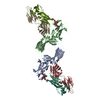 8gp3MC  8go8C  8gocC 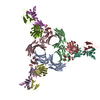 8gooC 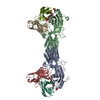 8i0nC 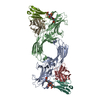 8i0qC 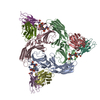 8i0zC 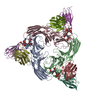 8i10C M: atomic model generated by this map C: citing same article ( |
|---|---|
| Similar structure data | Similarity search - Function & homology  F&H Search F&H Search |
- Links
Links
| EMDB pages |  EMDB (EBI/PDBe) / EMDB (EBI/PDBe) /  EMDataResource EMDataResource |
|---|---|
| Related items in Molecule of the Month |
- Map
Map
| File |  Download / File: emd_34188.map.gz / Format: CCP4 / Size: 421.9 MB / Type: IMAGE STORED AS FLOATING POINT NUMBER (4 BYTES) Download / File: emd_34188.map.gz / Format: CCP4 / Size: 421.9 MB / Type: IMAGE STORED AS FLOATING POINT NUMBER (4 BYTES) | ||||||||||||||||||||||||||||||||||||
|---|---|---|---|---|---|---|---|---|---|---|---|---|---|---|---|---|---|---|---|---|---|---|---|---|---|---|---|---|---|---|---|---|---|---|---|---|---|
| Annotation | Full map with pixel size 0.878. | ||||||||||||||||||||||||||||||||||||
| Projections & slices | Image control
Images are generated by Spider. | ||||||||||||||||||||||||||||||||||||
| Voxel size | X=Y=Z: 0.878 Å | ||||||||||||||||||||||||||||||||||||
| Density |
| ||||||||||||||||||||||||||||||||||||
| Symmetry | Space group: 1 | ||||||||||||||||||||||||||||||||||||
| Details | EMDB XML:
|
-Supplemental data
-Half map: Half map A with pixel size 0.878.
| File | emd_34188_half_map_1.map | ||||||||||||
|---|---|---|---|---|---|---|---|---|---|---|---|---|---|
| Annotation | Half map A with pixel size 0.878. | ||||||||||||
| Projections & Slices |
| ||||||||||||
| Density Histograms |
-Half map: Half map B with pixel size 0.878.
| File | emd_34188_half_map_2.map | ||||||||||||
|---|---|---|---|---|---|---|---|---|---|---|---|---|---|
| Annotation | Half map B with pixel size 0.878. | ||||||||||||
| Projections & Slices |
| ||||||||||||
| Density Histograms |
- Sample components
Sample components
-Entire : Peptide5 bound beta-arrestin1 in complex with Fab30
| Entire | Name: Peptide5 bound beta-arrestin1 in complex with Fab30 |
|---|---|
| Components |
|
-Supramolecule #1: Peptide5 bound beta-arrestin1 in complex with Fab30
| Supramolecule | Name: Peptide5 bound beta-arrestin1 in complex with Fab30 / type: complex / ID: 1 / Parent: 0 / Macromolecule list: all |
|---|---|
| Molecular weight | Theoretical: 190 KDa |
-Supramolecule #2: Beta-arrestin-1
| Supramolecule | Name: Beta-arrestin-1 / type: complex / ID: 2 / Parent: 1 / Macromolecule list: #1 |
|---|---|
| Source (natural) | Organism:  |
-Supramolecule #3: C-X-C chemokine receptor type 4
| Supramolecule | Name: C-X-C chemokine receptor type 4 / type: complex / ID: 3 / Parent: 1 / Macromolecule list: #2 |
|---|---|
| Source (natural) | Organism:  Homo sapiens (human) / Synthetically produced: Yes Homo sapiens (human) / Synthetically produced: Yes |
-Supramolecule #4: Fab30
| Supramolecule | Name: Fab30 / type: complex / ID: 4 / Parent: 1 / Macromolecule list: #3-#4 |
|---|---|
| Source (natural) | Organism:  |
-Macromolecule #1: Beta-arrestin-1
| Macromolecule | Name: Beta-arrestin-1 / type: protein_or_peptide / ID: 1 / Number of copies: 2 / Enantiomer: LEVO |
|---|---|
| Source (natural) | Organism:  |
| Molecular weight | Theoretical: 47.088508 KDa |
| Recombinant expression | Organism:  |
| Sequence | String: MGDKGTRVFK KASPNGKLTV YLGKRDFVDH IDLVDPVDGV VLVDPEYLKE RRVYVTLTCA FRYGREDLDV LGLTFRKDLF VANVQSFPP APEDKKPLTR LQERLIKKLG EHAYPFTFEI PPNLPCSVTL QPGPEDTGKA CGVDYEVKAF CAENLEEKIH K RNSVRLVI ...String: MGDKGTRVFK KASPNGKLTV YLGKRDFVDH IDLVDPVDGV VLVDPEYLKE RRVYVTLTCA FRYGREDLDV LGLTFRKDLF VANVQSFPP APEDKKPLTR LQERLIKKLG EHAYPFTFEI PPNLPCSVTL QPGPEDTGKA CGVDYEVKAF CAENLEEKIH K RNSVRLVI RKVQYAPERP GPQPTAETTR QFLMSDKPLH LEASLDKEIY YHGEPISVNV HVTNNTNKTV KKIKISVRQY AD ICLFNTA QYKCPVAMEE ADDTVAPSST FCKVYTLTPF LANNREKRGL ALDGKLKHED TNLASSTLLR EGANREILGI IVS YKVKVK LVVSRGGLLG DLASSDVAVE LPFTLMHPKP KEEPPHREVP ESETPVDTNL IELDTNDDDI VFEDFARQRL KGMK DDKDE EDDGTGSPHL NNR UniProtKB: Beta-arrestin-1 |
-Macromolecule #2: C-X-C chemokine receptor type 4
| Macromolecule | Name: C-X-C chemokine receptor type 4 / type: protein_or_peptide / ID: 2 / Number of copies: 2 / Enantiomer: LEVO |
|---|---|
| Source (natural) | Organism:  Homo sapiens (human) Homo sapiens (human) |
| Molecular weight | Theoretical: 2.38053 KDa |
| Sequence | String: GHSSV(SEP)(TPO)E(SEP)E (SEP)(SEP)(SEP)FH(SEP)(SEP) UniProtKB: C-X-C chemokine receptor type 4 |
-Macromolecule #3: Fab30 Heavy Chain
| Macromolecule | Name: Fab30 Heavy Chain / type: protein_or_peptide / ID: 3 / Number of copies: 2 / Enantiomer: LEVO |
|---|---|
| Source (natural) | Organism:  |
| Molecular weight | Theoretical: 25.512354 KDa |
| Recombinant expression | Organism:  |
| Sequence | String: EISEVQLVES GGGLVQPGGS LRLSCAASGF NVYSSSIHWV RQAPGKGLEW VASISSYYGY TYYADSVKGR FTISADTSKN TAYLQMNSL RAEDTAVYYC ARSRQFWYSG LDYWGQGTLV TVSSASTKGP SVFPLAPSSK STSGGTAALG CLVKDYFPEP V TVSWNSGA ...String: EISEVQLVES GGGLVQPGGS LRLSCAASGF NVYSSSIHWV RQAPGKGLEW VASISSYYGY TYYADSVKGR FTISADTSKN TAYLQMNSL RAEDTAVYYC ARSRQFWYSG LDYWGQGTLV TVSSASTKGP SVFPLAPSSK STSGGTAALG CLVKDYFPEP V TVSWNSGA LTSGVHTFPA VLQSSGLYSL SSVVTVPSSS LGTQTYICNV NHKPSNTKVD KKVEPKSCDK THHHHHHHH |
-Macromolecule #4: Fab30 Light Chain
| Macromolecule | Name: Fab30 Light Chain / type: protein_or_peptide / ID: 4 / Number of copies: 2 / Enantiomer: LEVO |
|---|---|
| Source (natural) | Organism:  |
| Molecular weight | Theoretical: 23.435064 KDa |
| Recombinant expression | Organism:  |
| Sequence | String: SDIQMTQSPS SLSASVGDRV TITCRASQSV SSAVAWYQQK PGKAPKLLIY SASSLYSGVP SRFSGSRSGT DFTLTISSLQ PEDFATYYC QQYKYVPVTF GQGTKVEIKR TVAAPSVFIF PPSDSQLKSG TASVVCLLNN FYPREAKVQW KVDNALQSGN S QESVTEQD ...String: SDIQMTQSPS SLSASVGDRV TITCRASQSV SSAVAWYQQK PGKAPKLLIY SASSLYSGVP SRFSGSRSGT DFTLTISSLQ PEDFATYYC QQYKYVPVTF GQGTKVEIKR TVAAPSVFIF PPSDSQLKSG TASVVCLLNN FYPREAKVQW KVDNALQSGN S QESVTEQD SKDSTYSLSS TLTLSKADYE KHKVYACEVT HQGLSSPVTK SFNRGEC |
-Experimental details
-Structure determination
| Method | cryo EM |
|---|---|
 Processing Processing | single particle reconstruction |
| Aggregation state | particle |
- Sample preparation
Sample preparation
| Buffer | pH: 7.4 Component:
| |||||||||
|---|---|---|---|---|---|---|---|---|---|---|
| Grid | Model: Quantifoil R2/2 / Material: COPPER / Mesh: 300 / Pretreatment - Type: GLOW DISCHARGE / Pretreatment - Time: 45 sec. | |||||||||
| Vitrification | Cryogen name: ETHANE / Chamber humidity: 90 % / Chamber temperature: 283.15 K / Instrument: LEICA EM GP / Details: Blotted for 3 seconds before plunging.. |
- Electron microscopy
Electron microscopy
| Microscope | TFS GLACIOS |
|---|---|
| Image recording | Film or detector model: GATAN K3 (6k x 4k) / Detector mode: COUNTING / Number real images: 5637 / Average electron dose: 49.3 e/Å2 |
| Electron beam | Acceleration voltage: 200 kV / Electron source:  FIELD EMISSION GUN FIELD EMISSION GUN |
| Electron optics | Illumination mode: FLOOD BEAM / Imaging mode: BRIGHT FIELD / Cs: 2.7 mm / Nominal defocus max: 2.5 µm / Nominal defocus min: 0.5 µm / Nominal magnification: 46000 |
| Sample stage | Cooling holder cryogen: NITROGEN |
 Movie
Movie Controller
Controller










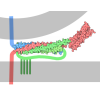


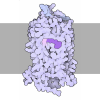
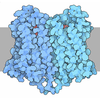


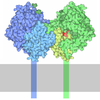
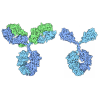



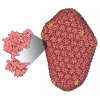


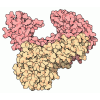
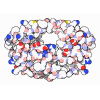
 Z (Sec.)
Z (Sec.) Y (Row.)
Y (Row.) X (Col.)
X (Col.)




































